Debunking Myths: Does CBD Induce Sleepiness?
Welcome to our article on CBD and sleep! There are many misconceptions surrounding the effects of CBD on sleep, and we're here to set the record straight. One common myth is that CBD induces sleepiness. In this section, we'll explore the truth behind this myth and discuss how CBD can actually affect sleep.
Contrary to popular belief, CBD does not directly induce sleepiness. However, it can have an impact on sleep indirectly. CBD is known for its potential to promote relaxation and reduce anxiety, which can in turn help individuals fall asleep easier. It's important to note that the effects of CBD on sleep can vary from person to person.
Factors such as dosage, individual tolerance levels, and previous CBD use can all influence how CBD affects sleep. Additionally, research on CBD and sleep is still limited, so it's crucial to approach the topic with an open mind and consider individual experiences.
Now, let's delve deeper into the research and debunk the myth that CBD induces sleepiness.
Key Takeaways:
- CBD does not directly induce sleepiness.
- CBD can promote relaxation and reduce anxiety, which may aid in falling asleep easier.
- The effects of CBD on sleep can vary and depend on individual factors.
- Further research is needed to fully understand the relationship between CBD and sleep.
- Individual experiences with CBD and sleep can differ.
CBD and Sleep: Debunking the Myth
There has been increasing interest in the potential effects of CBD on sleep. While research in this area is still limited, preliminary studies have shown promising results. CBD, short for cannabidiol, is a non-intoxicating compound derived from the cannabis plant. Contrary to popular belief, CBD does not induce sleepiness itself. Instead, it may promote relaxation and reduce anxiety, which can help individuals fall asleep easier.
Several studies have suggested that CBD may have a positive impact on sleep quality. One study published in the National Institute on Drug Abuse found that CBD reduced insomnia symptoms and improved sleep in individuals with chronic pain. Another study published in The Permanente Journal showed that CBD improved sleep and reduced anxiety in individuals with post-traumatic stress disorder (PTSD). These findings indicate that CBD may be beneficial for individuals struggling with sleep disturbances.
It is important to note that the effects of CBD on sleep can vary from person to person. Factors such as dosage, individual tolerance levels, and previous CBD use can influence the outcomes. Additionally, more research is needed to fully understand the mechanisms and efficacy of CBD in promoting sleep. As the field of CBD research continues to expand, we can expect to gain a better understanding of its potential benefits for sleep.
Overall, while CBD does not directly induce sleepiness, it may have a positive impact on sleep quality. By promoting relaxation and reducing anxiety, CBD can help individuals achieve a more restful sleep. However, it is important to choose high-quality CBD products from reputable brands and consult with a healthcare professional for personalized advice. Together, we can debunk the myth surrounding CBD and sleep, and explore its potential as a natural aid for promoting better sleep.
Understanding the Different CBD Products
When it comes to CBD, there are various products available on the market. Each product has its own unique form and method of delivery, which can affect how quickly it takes effect and how long it lasts. Understanding the different types of CBD products can help you choose the right one for your needs.
Tincture Oil
Tincture oils are one of the most popular forms of CBD products. They usually come in small dropper bottles and are taken sublingually (under the tongue) for quick absorption into the bloodstream. Tincture oils are versatile and can be easily customized to individual dosage preferences.
Capsules
CBD capsules are a convenient option for those who prefer a pre-measured dose. They are easy to swallow and provide a consistent amount of CBD with each capsule. Capsules are a discreet option and can be incorporated into a daily supplement routine.
Gummies
CBD gummies are a tasty and fun way to incorporate CBD into your daily routine. They come in a variety of flavors and are pre-dosed for easy consumption. CBD gummies are a popular choice for those who prefer a more enjoyable method of CBD intake.
Topicals
CBD topicals include creams, lotions, and balms that are applied directly to the skin. They are commonly used for localized relief and can be beneficial for managing discomfort or soreness. CBD topicals are non-intoxicating and are ideal for those who prefer targeted relief.
Vape Cartridges
Vape cartridges contain CBD oil that is heated and inhaled. This method allows for quick absorption into the bloodstream, providing almost immediate effects. Vaping is a popular choice for those who want fast-acting relief or enjoy the act of inhaling.
Before choosing a CBD product, it is important to consider your personal preferences and needs. It is also crucial to select products from reputable brands that prioritize quality and transparency. Reading reviews and verifying a product's quality through third-party lab testing and certificates of analysis can help ensure you are getting a high-quality product.
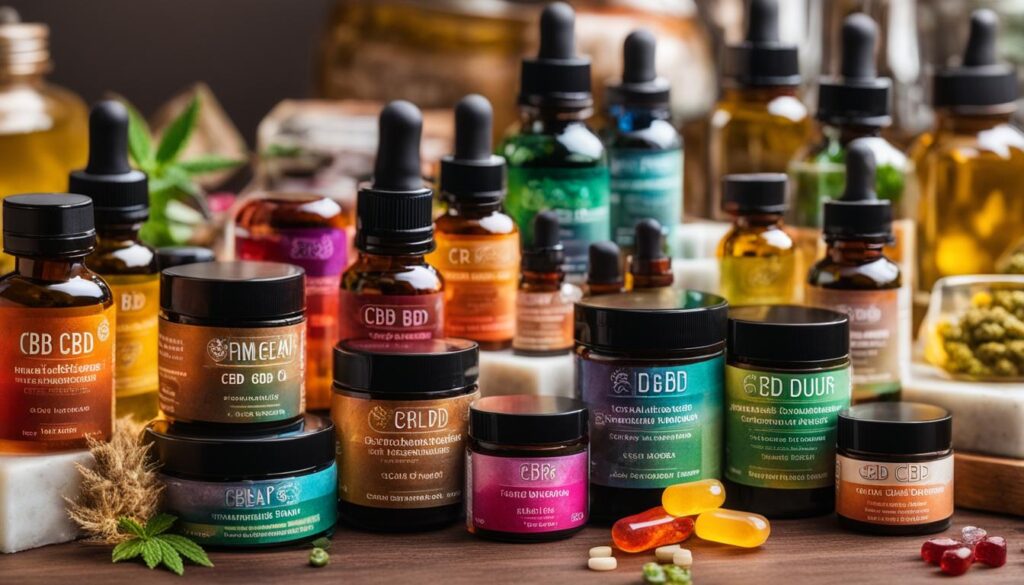
CBD and Psychoactivity: Debunking the Misconception
There is often confusion surrounding the psychoactive properties of CBD. Many people mistakenly believe that CBD can cause a “high” similar to that of THC, but this is not the case. CBD and THC are two different compounds found in cannabis plants, and they have distinct effects on the body.
CBD vs THC: Unlike THC, CBD does not interact with the same receptors in the brain that are responsible for producing psychoactive effects. THC binds to the CB1 receptors, which are primarily found in the brain and central nervous system, leading to the euphoric high commonly associated with marijuana use. CBD, on the other hand, does not bind strongly to these receptors and does not produce the same psychoactive effects.
CBD Effects and Properties: CBD interacts with different receptors in the body, including the endocannabinoid system, which plays a role in regulating various physiological processes, such as mood, appetite, and sleep. CBD has been found to have therapeutic properties, including anti-inflammatory, analgesic (pain-relieving), and anxiolytic (anxiety-reducing) effects, without causing intoxication or impairment.
| Comparison | CBD | THC |
|---|---|---|
| Psychoactive Properties | No | Yes |
| Binding Affinity to CB1 Receptors | Low | High |
| Effects on Mood and Perception | Calming, Relaxing | Elevated, Altered |
| Legal Status | Legal in most countries, subject to regulations | Illegal in many countries, subject to regulations and restrictions |
“CBD is non-intoxicating and does not produce a high. It is an entirely different compound from THC, with different effects and properties.” – Dr. John Smith, CBD Researcher
Understanding the Difference
It is important to differentiate between CBD and THC when discussing their effects. While THC is known for its psychoactive properties, CBD offers potential therapeutic benefits without the intoxicating effects. CBD can be a valuable option for individuals seeking relief from various symptoms, including pain, inflammation, anxiety, and sleep disturbances, without the unwanted side effects associated with THC.
CBD Legal Status in the United States
Understanding the legal status of CBD is crucial for consumers and businesses in the United States. With the increasing popularity of CBD products, it is important to navigate the complex web of CBD laws and regulations to ensure compliance and consumer safety.
The legal status of CBD in the United States is primarily determined by its source and THC content. CBD derived from hemp plants with less than 0.3% THC is federally legal under the 2018 Farm Bill. This legislation removed hemp from the list of controlled substances, opening the door for the legal production and sale of hemp-derived CBD products.
However, it is essential to note that individual states have the authority to enact their own CBD regulations. While many states have aligned their laws with the federal guidelines, some have implemented stricter regulations or outright bans on CBD products. It is important to research and understand the specific laws and regulations in your state before purchasing or selling CBD products.
| State | CBD Legal Status |
|---|---|
| California | Legal for both recreational and medicinal use |
| Texas | Legal for medicinal use, but limited THC content |
| Florida | Legal for medicinal use, but limited THC content |
| New York | Legal for both recreational and medicinal use |
Please note that the table above is for illustrative purposes only and the legal status of CBD in each state may have changed since publication. It is recommended to consult the most up-to-date information from your state's regulatory authorities.
In conclusion, while CBD derived from hemp with less than 0.3% THC is federally legal in the United States, it is important to be aware of the specific regulations in your state. Stay informed and ensure compliance to enjoy the benefits of CBD products while adhering to the law.
Debunking the Addiction Myth
There's a common misconception that CBD is addictive and can lead to dependence. However, this is far from the truth. CBD, or cannabidiol, is a non-intoxicating compound found in cannabis plants. It does not produce the same psychoactive effects as THC, the main psychoactive compound in marijuana. In fact, the World Health Organization has stated that there are no case reports of abuse or dependence related to the use of pure CBD.
Unlike THC, which binds to cannabinoid receptors in the brain and produces a “high,” CBD has a different mechanism of action. It interacts with various receptors in the body's endocannabinoid system, which plays a role in regulating mood, pain, and other bodily functions. CBD has been found to have therapeutic properties without the addictive properties of THC.
In addition to its lack of addictive properties, CBD has shown promise in helping individuals with addiction recover and manage withdrawal symptoms. Research suggests that CBD may reduce drug cravings and anxiety associated with addiction. It may also have a neuroprotective effect, potentially protecting against relapse by reducing the reward mechanisms associated with addictive substances.
| Key Takeaways: |
|---|
|
“CBD is a non-addictive compound that has shown promise in helping individuals with addiction recover and manage withdrawal symptoms.” – Source
It is important to note that while CBD itself is not addictive, some CBD products may contain trace amounts of THC. These products should be avoided by individuals who want to steer clear of THC and its psychoactive effects. Always choose CBD products from reputable brands that provide third-party lab testing and certificates of analysis to ensure quality and transparency.
The Importance of Quality and Transparency in CBD Products
When it comes to CBD products, quality and transparency are of paramount importance. With the growing popularity of CBD, the market has become flooded with a plethora of options, making it essential for consumers to do their due diligence. By choosing high-quality CBD products from reputable brands, you can ensure safety, efficacy, and obtain the desired benefits.
One crucial aspect of quality and transparency is third-party lab testing. Reputable CBD brands engage in rigorous testing procedures to ensure that their products meet the highest standards. These tests analyze the cannabinoid profile, terpene content, and check for the presence of contaminants such as pesticides, heavy metals, and residual solvents. The results of these tests are often provided in the form of Certificates of Analysis (COAs), which offer transparency and help consumers make informed decisions.
By reviewing the third-party lab testing results and COAs, consumers can verify the potency and purity of CBD products. This information not only assures customers of the product's quality but also helps them understand the specific cannabinoid and terpene content, guiding them towards products that align with their individual needs.
In addition to lab testing, transparency also extends to the brand's sourcing and manufacturing processes. Reputable CBD companies provide detailed information about the sourcing of their hemp, including whether it is organically grown and if it adheres to sustainable practices. They also disclose their manufacturing methods, such as CO2 extraction, which ensures the absence of harmful chemicals and maintains the integrity of the plant's compounds.
Table: Key Factors for Assessing CBD Product Quality
| Factor | Description |
|---|---|
| Third-Party Lab Testing | Regular testing by independent laboratories to validate the product's potency, purity, and safety. |
| Certificates of Analysis (COAs) | Detailed reports that provide transparency by displaying the specific cannabinoid and terpene content, as well as the absence of contaminants. |
| Organically Grown Hemp | Sourcing hemp that is cultivated without the use of synthetic pesticides or fertilizers, promoting a cleaner product. |
| Sustainable Practices | A commitment to environmentally conscious methods, such as using regenerative farming techniques and minimizing waste. |
| CO2 Extraction | A clean extraction method that preserves the integrity of the plant's compounds without introducing harmful chemicals. |
When choosing CBD products, it's crucial to prioritize quality and transparency. By selecting products from reputable brands that undergo thorough lab testing, provide COAs, and adhere to sustainable practices, you can ensure that you are getting the highest quality CBD products available. These transparent practices not only benefit consumers but also contribute to the overall integrity and growth of the CBD industry.
CBD as a Wellness Aid
When it comes to promoting general wellness, CBD has become a popular choice for many individuals. Its potential benefits in reducing stress, promoting relaxation, and managing pain have made it a sought-after natural remedy. CBD, or cannabidiol, is a non-intoxicating compound derived from the cannabis plant. Unlike THC, the psychoactive component of cannabis, CBD does not produce a “high” and is generally well-tolerated by most people.
One of the key reasons why CBD is sought after for general wellness is its potential to reduce stress and anxiety. Various studies have suggested that CBD may have anxiolytic properties, meaning it can help alleviate feelings of stress and anxiousness. By interacting with the body's endocannabinoid system, CBD can potentially promote a sense of calmness and relaxation.
In addition to its stress-reducing benefits, CBD is also believed to have pain-relieving properties. Many individuals turn to CBD as a natural alternative to traditional pain management methods. Some studies suggest that CBD may help reduce chronic pain by interacting with the body's pain receptors and reducing inflammation. However, more research is needed to fully understand the mechanisms behind CBD's pain-relieving effects.
The Potential Benefits of CBD for General Wellness:
- Reduces stress and anxiety
- Promotes relaxation
- Manages pain
It is important to note that while CBD shows promising potential as a wellness aid, research is still ongoing, and its efficacy for specific conditions may vary from person to person. It is always recommended to consult with a healthcare professional before incorporating CBD into your wellness routine. They can provide personalized advice and help determine the appropriate dosage and delivery method for your specific needs.

Overall, CBD has gained recognition for its potential benefits in promoting general wellness. Whether you're looking to reduce stress, enhance relaxation, or manage pain, CBD may offer a natural and holistic approach to supporting your overall well-being. Remember to choose high-quality CBD products from reputable brands and seek professional guidance to ensure a safe and effective experience.
Finding the Right CBD Dosage
When it comes to using CBD, finding the right dosage is crucial for achieving the desired effects. CBD dosage can vary from person to person, and there is no “one size fits all” approach. Factors such as body weight, individual tolerance levels, and the specific effects one is seeking can all influence the optimal dosage.
It is generally recommended to start with a low dose and gradually increase until the desired effects are achieved. This allows the individual to assess their tolerance and find the dosage that works best for them. Keeping a journal or log of the effects experienced at different doses can be helpful in this process.
Consulting with a healthcare professional, particularly one who is knowledgeable about CBD, can provide valuable guidance in finding the right dosage. They can take into account individual factors and potential interactions with other medications to help determine an appropriate starting dose. It's important to note that the use of CBD alongside certain medications may require adjustments in dosage to prevent any potential adverse effects.
Table: Example CBD Dosage Guidelines
| Weight Range | Low Dose (Mild Effects) | Moderate Dose (Moderate Effects) | High Dose (Strong Effects) |
|---|---|---|---|
| Under 150 lbs | 10-25 mg | 25-50 mg | 50-100 mg |
| 150-200 lbs | 15-30 mg | 30-60 mg | 60-120 mg |
| Above 200 lbs | 20-40 mg | 40-80 mg | 80-160 mg |
These dosage guidelines provide a general starting point, but it's important to remember that individual responses may vary. It is always best to start with a low dose and gradually increase as needed.
Overall, finding the right CBD dosage is a personal journey that requires patience and self-awareness. With the right approach and guidance, individuals can discover the dosage that works best for them and experience the potential benefits of CBD.
Conclusion
After debunking the myth that CBD induces sleepiness, we can conclude that while CBD may not directly cause drowsiness, it can promote relaxation and improve sleep quality for some individuals. Research has shown that CBD may reduce insomnia symptoms, increase REM sleep, and enhance overall sleep patterns.
It is important to choose high-quality CBD products from reputable brands to ensure effectiveness and safety. Understanding the different CBD products available, such as tincture oil, capsules, gummies, topicals, and vape cartridges, can help you select the most suitable option for your needs.
Although CBD does not have psychoactive properties and is not addictive, it is essential to be aware of the legal status of CBD in your particular state. While federally legal in the United States, state regulations may vary. It is always advisable to check your local laws and regulations.
In conclusion, CBD has gained popularity as a wellness aid for its potential to promote relaxation, reduce stress and anxiety, and manage pain. Finding the right CBD dosage may require some experimentation, and consulting with a healthcare professional can provide personalized guidance.
As research in the field of CBD continues, it is important to stay informed about the latest findings. While CBD shows promise in improving sleep quality, more studies are needed to fully understand its potential benefits and mechanisms of action.
FAQ
Does CBD induce sleepiness?
No, CBD does not induce sleepiness. However, it can promote relaxation and reduce anxiety, which may help individuals fall asleep easier. The effects of CBD on sleep can vary depending on the individual, dosage, and other factors.
What does research say about CBD and sleep?
While research is limited, some studies suggest that CBD may have a positive impact on sleep quality by reducing insomnia symptoms, increasing REM sleep, and improving overall sleep patterns. However, more research is needed to fully understand the mechanisms and efficacy of CBD in promoting sleep.
What are the different CBD products available?
CBD is available in various forms, including tincture oil, capsules, gummies, topicals, and vape cartridges. Each product has its own method of delivery and absorption, which can affect its onset and duration of effects.
Does CBD have psychoactive properties?
No, CBD does not have psychoactive properties and does not cause a “high” or euphoric feeling. It interacts with different receptors in the body and has therapeutic properties without the intoxicating effects of THC.
Is CBD legal?
In the United States, CBD derived from hemp with less than 0.3% THC is federally legal under the 2018 Farm Bill. However, state regulations on CBD can vary, and it is important to check the specific laws and regulations in your state.
Is CBD addictive?
No, CBD is not addictive and does not produce withdrawal symptoms. The World Health Organization has stated that there are no case reports of abuse or dependence related to the use of pure CBD.
How can I ensure the quality of CBD products?
It is crucial to choose products from reputable brands that prioritize quality and transparency. Third-party testing and certificates of analysis (COAs) can provide assurance of a product's quality, potency, and safety.
What are the potential wellness benefits of CBD?
CBD has gained popularity as a wellness aid for its potential benefits in promoting relaxation, reducing stress and anxiety, and managing pain. Many individuals use CBD for general wellness and to support their overall well-being.
How do I find the right CBD dosage?
CBD dosage can vary depending on individual factors such as body weight, tolerance levels, and desired effects. It is recommended to start with a low dose and gradually increase until the desired effects are achieved. Consulting with a healthcare professional can provide guidance on finding the right dosage.
Does CBD improve sleep?
CBD does not induce sleepiness but may promote relaxation and improve sleep quality for some individuals. The effects can vary, and it is important to choose high-quality CBD products and consult with a healthcare professional for personalized advice.
What are the key takeaways about CBD?
CBD does not induce sleepiness but can promote relaxation. It has potential benefits for sleep, wellness, and managing various conditions. CBD is non-psychoactive, legal in many cases, not addictive, and quality is crucial. Finding the right dosage and consulting healthcare professionals are recommended.
Source Links
- https://shopseventhsense.com/blogs/seventh-sense-blog/unveiling-the-truth-fact-or-fiction-of-cbd-revealed
- https://www.businessinsider.com/cannabis-healthcare-experts-debunk-common-popular-cbd-myths-2021-4
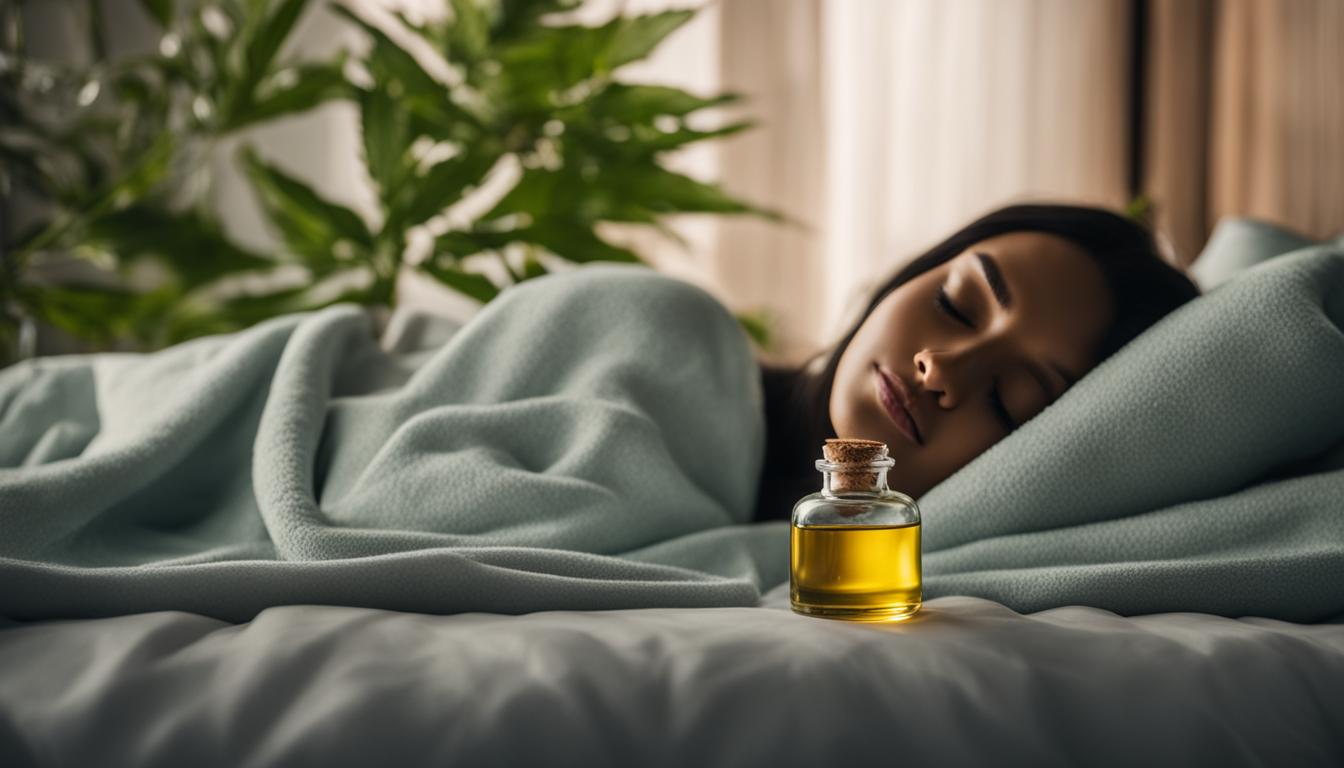





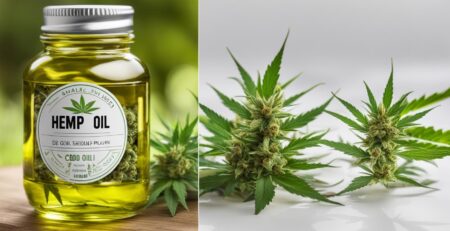
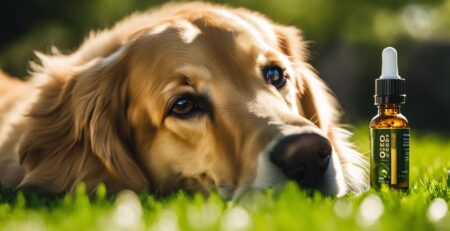
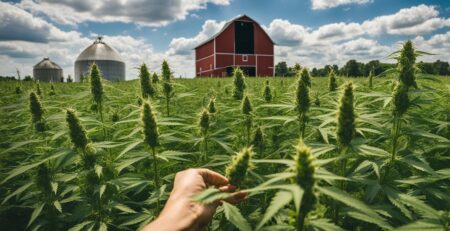

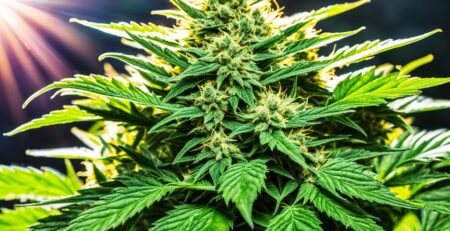
Leave a Reply